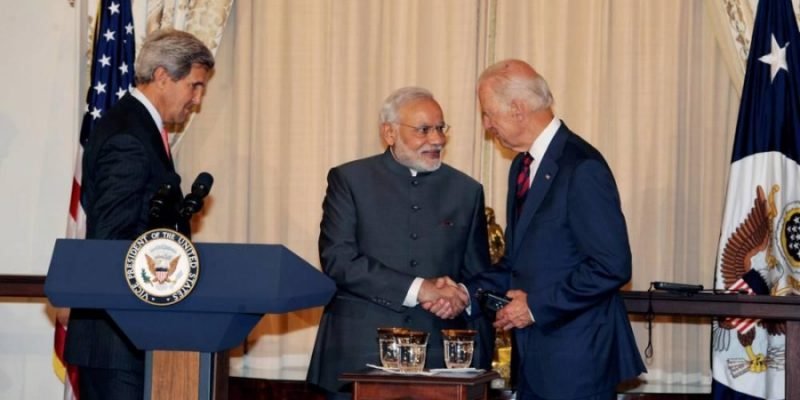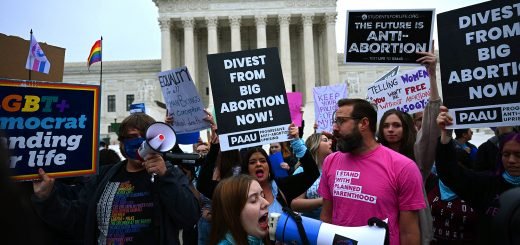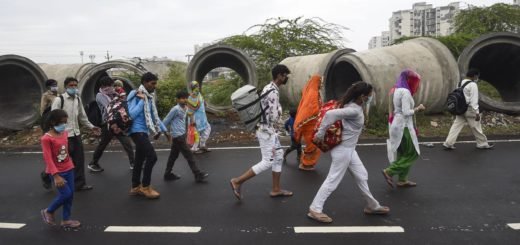The Biden-Harris White House reaffirms the importance of India-US ties

US President Joe Biden in his first official telephonic conversation with Prime Minister Modi affirmed that United States is committed with India to work closely to combat COVID-19, climate change, to rebuild the global economy and stand together against global terrorism. Both countries also affirmed their commitment to “rules-based international order”.
The leaders agreed to continue close cooperation in promoting a free and open Indo-Pacific, including support for freedom of navigation, territorial integrity and a stronger regional architecture through the Quadinitiative. Prime Minister Modi and US President Biden agreed to stay in close touch on a range of global challenges and a host of regional issues and their “shared priorities”, with both of them looking forward to consolidating strategic partnerships to further peace and security in the Indo-Pacific region and beyond and to what the US and India can achieve working together for their people and their nations. Underscoring his desire to defend democratic institutions and norms around the world, President Biden noted that a “shared commitment to democratic values is the bedrock for the US-India relationship”. PM Modi and US President Biden further shared that the rule of law and the democratic process must be upheld in Myanmar, the White House readout stated.
While this was the first conversation between PM Modi and Biden since the latter assumed office as the 46th President of the United States, at least three senior-level conversations, at the National Security Advisors, External Affairs and Defence Ministerial level round of talks, have already taken place in the past three weeks which signifies the importance of India-US tied under the Biden-Harris White House. The United States and India have had close ties under the previous U.S. administration as well. Trump’s White House saw New Delhi as an ally in its hardline stance against China.
Recently, India has seen a series of messages from American celebrities and activists in support of the ongoing protest by the Indian farmers against the new ‘Farm Laws’. Following the crackdown against the farmers, the U.S. State Department had come out in support of the right to peaceful protests by the farmers. In his conversation with PM Modi, emphasizing that Biden’s administration will be vocal about promoting democratic principles, the White House readout stated, “The President underscored his desire to defend democratic institutions and norms around the world and noted that a shared commitment to democratic values is the bedrock for the U.S.-India relationship.” However, New Delhi refrained from mentioning anything such in its MEA press-release.

Discussing their “shared priorities” and emphasizing their commitment to a “rules-based international order”, Prime Minister Narendra Modi and US President Joseph R Biden expressed their commitment to looking forward to consolidating strategic partnership for enhancing peace and security in the Indo-Pacific region and beyond. The reference to rules-based international order and peace and security in the Indo-Pacific region is an utter reference to China’s belligerence in the region — from the South China Sea to the India-China border. This conversation comes in the backdrop of reports in the Japanese media that in coming days, the US is planning to hold a Quad summit through video-conferencing. The MEA statement noted that India “reiterated the importance of working with like-minded countries to ensure a rules-based international order and a free, open and inclusive Indo-Pacific region”.
While cooperation in the Indo-Pacific and fight with the Covid-19 pandemic have been the two areas of continuity between the Donald Trump administration and the incoming Biden presidency, climate change has been an old favourite of the Democratic establishment. Climate change, which was not a priority during the Trump years, is once again back on the agenda with Biden’s taking the office as the President. The Obama administration had given high priority to climate change, and the US had reached out to India during the climate change negotiations at Copenhagen (2009) and Paris (2015).
Welcoming President Biden’s decision to re-commit to the Paris Agreement and his calls to collaborate on combatting climate change, PM Modi highlighted India’s ambitious targets it has set for itself in the area of renewable energy. He also agreed to participate in a climate summit Biden administration is to host in April this year, according to the White House statement. Albeit India, being the third-largest emitter of carbon dioxide after China and the United States has argued that, as a developing country, it should not be subject to the same rules as richer countries.
Prime Minister Modi taking the opportunity, invited President Biden and first lady Dr Jill Biden to visit India at their earliest conveniences. Both the leaders discussed at length regional developments and the wider geopolitical context for further elevating the India-US Strategic Partnership.



















